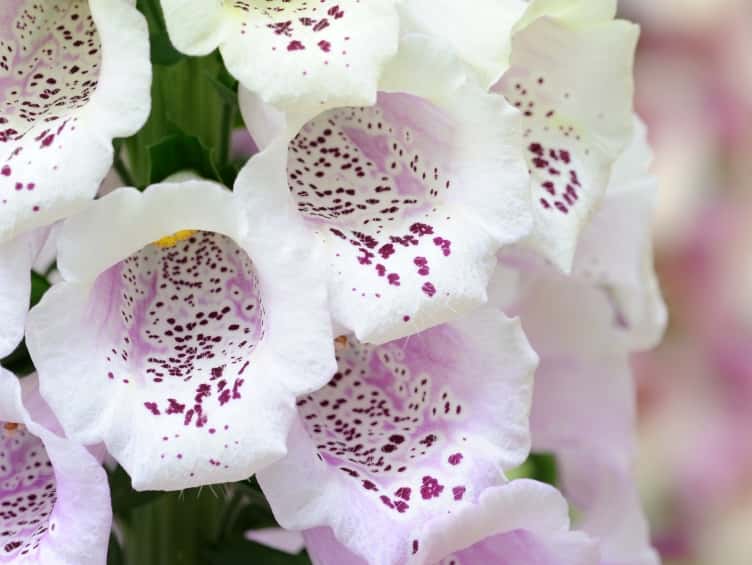Foxglove - Toxic to the Heart

The Bottom Line
Foxglove grows throughout the United States. It grows in the wild and is often cultivated for its beauty in private gardens. All parts of the plant are poisonous, possibly even deadly, if swallowed.

The Full Story
Foxglove is an attractive plant that grows throughout the United States. It grows in the wild and is cultivated in private gardens for its beauty. Its bell-shaped flowers are usually bright purple but can sometimes be white, cream yellow, pink, or rose and generally bloom in the spring. Foxglove also has a dry fruit containing many seeds. Both the flowers and berries attract children. All parts of the plant are extremely poisonous.
The botanical name for foxglove is Digitalis purpurea. You might recognize "digitalis" as the name of a heart medicine. In fact, the medicine is derived from this plant, and that is why measuring digoxin (a form of digitalis) concentrations in the blood can help detect foxglove poisoning. When formulated into a medication with a controlled dosage, digitalis is valuable in treating heart failure. It helps a weakened heart pump harder. People who eat any part of the plant or make tea from the leaves are, in essence, taking an unregulated dose of heart medicine. This can cause the heart rate to slow down or become irregular. Both can be dangerous and life threatening.
Foxglove is one of many reasons to watch children closely when they play outdoors. It’s also an excellent reason NOT to prepare your own herbal medicines, tea, or food from wild plants or plants growing in your garden unless you are an expert and know how to do so safely.
If anyone consumes any part of the foxglove plant, do not induce vomiting. Call Poison Control right away at 1-800-222-1222. Expert assistance is available 24 hours a day.
Serkalem Mekonnen, RN, BSN, MPH
Certified Specialist in Poison Information
Poisoned?
Call 1-800-222-1222 or
Prevention Tips
- Do not plant or grow foxglove in gardens where children or pets play.
- When outdoors, watch children and pets closely to be sure they do not eat unknown plants, seeds, or berries.
- Do not prepare your own herbal medicines.
- Do not prepare food or tea from plants unless you are an expert and know how to do so safely.
This Really Happened
A man made a sauce out of herbs from the garden and what he thought was borage. He had mistakenly picked about 12 leaves of young foxglove instead. He and his wife ate the sauce made with foxglove leaves. The following day, the husband called Poison Control concerned because he was nauseated, weak, and having trouble sleeping. His wife was also feeling weak. He was aware that he might have mistaken the foxglove for borage. Poison Control told him that he and his wife should to go to the nearest emergency room right away.
Poison Control advised the ER to check the concentrations of digoxin and electrolytes, such as potassium, in both patients’ blood. The digitalis present in foxglove is detected by assays for the drug digoxin.
The digoxin concentrations were elevated in both patients. The wife experienced very low heart rate. Her heart even stopped beating for several seconds at a time while she was in the ER. The husband also experienced low heart rate. Poison Control recommended giving both patients the antidote for digoxin. Both of the patients’ symptoms improved after receiving the antidote.
The patients were discharged home after 2 nights in the hospital but they continued to have some symptoms, like feeling dizzy and having low heart rate, for several more days.
For More Information
True Stories for Springtime (The Poison Post®)
Skin Problems from Outdoor Plants (The Poison Post ®)
Poisonous and Non-Poisonous Plants: An Illustrated List
Foxglove Poisoning (Medline Plus)
Azaleas and Rhododendrons (The Poison Post®)
For Pet Owners:
References
Dyer S. Plant exposures: wilderness medicine. Emerg Med Clin North Am. 2004;22(2):299-313.
Poisoned?
Call 1-800-222-1222 or
Prevention Tips
- Do not plant or grow foxglove in gardens where children or pets play.
- When outdoors, watch children and pets closely to be sure they do not eat unknown plants, seeds, or berries.
- Do not prepare your own herbal medicines.
- Do not prepare food or tea from plants unless you are an expert and know how to do so safely.
This Really Happened
A man made a sauce out of herbs from the garden and what he thought was borage. He had mistakenly picked about 12 leaves of young foxglove instead. He and his wife ate the sauce made with foxglove leaves. The following day, the husband called Poison Control concerned because he was nauseated, weak, and having trouble sleeping. His wife was also feeling weak. He was aware that he might have mistaken the foxglove for borage. Poison Control told him that he and his wife should to go to the nearest emergency room right away.
Poison Control advised the ER to check the concentrations of digoxin and electrolytes, such as potassium, in both patients’ blood. The digitalis present in foxglove is detected by assays for the drug digoxin.
The digoxin concentrations were elevated in both patients. The wife experienced very low heart rate. Her heart even stopped beating for several seconds at a time while she was in the ER. The husband also experienced low heart rate. Poison Control recommended giving both patients the antidote for digoxin. Both of the patients’ symptoms improved after receiving the antidote.
The patients were discharged home after 2 nights in the hospital but they continued to have some symptoms, like feeling dizzy and having low heart rate, for several more days.
